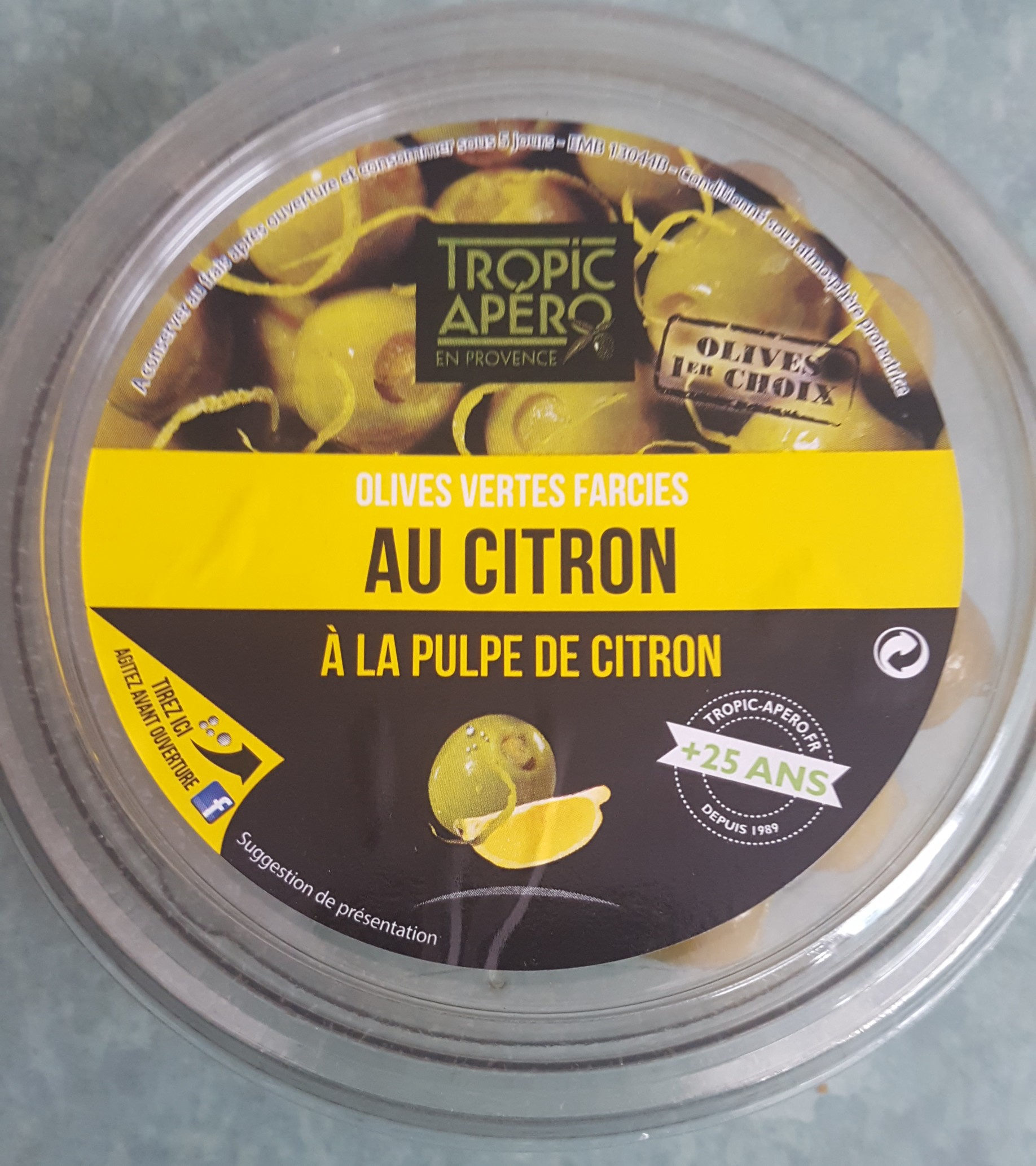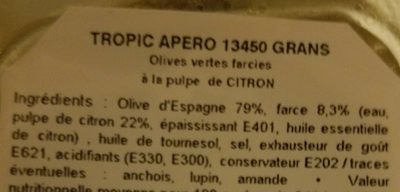Help us make food transparency the norm!
As a non-profit organization, we depend on your donations to continue informing consumers around the world about what they eat.
The food revolution starts with you!
Olives vertes farcies a la pulpe de citron - Tropic Apero
Olives vertes farcies a la pulpe de citron - Tropic Apero
This product page is not complete. You can help to complete it by editing it and adding more data from the photos we have, or by taking more photos using the app for Android or iPhone/iPad. Thank you!
×
Barcode: 3382510032151 (EAN / EAN-13)
Brands: Tropic Apero
Categories: Plant-based foods and beverages, Plant-based foods, Pickles, Olive tree products, Plant-based pickles, Olives, Green olives, Stuffed olives, Green stuffed olives, Green olives stuffed of lemon
Labels, certifications, awards:
Green Dot
Countries where sold: France
Matching with your preferences
Health
Ingredients
-
16 ingredients
French: Olive d'Espagne 79%, farce (eau, pulpe de citron 22%, épaississant E401, huile essentielle de citron) huile de tournesol, sel, exhausteur de goût E621, acidifiants (E330, E300), conservateur E202 / traces éventuelles lupin, amande, anchoisTraces: Fish, Nuts
Food processing
-
Ultra processed foods
Elements that indicate the product is in the 4 - Ultra processed food and drink products group:
- Additive: E401 - Sodium alginate
- Additive: E621 - Monosodium glutamate
- Ingredient: Flavour enhancer
- Ingredient: Thickener
Food products are classified into 4 groups according to their degree of processing:
- Unprocessed or minimally processed foods
- Processed culinary ingredients
- Processed foods
- Ultra processed foods
The determination of the group is based on the category of the product and on the ingredients it contains.
Additives
-
E202 - Potassium sorbate
Potassium sorbate (E202) is a synthetic food preservative commonly used to extend the shelf life of various food products.
It works by inhibiting the growth of molds, yeast, and some bacteria, preventing spoilage. When added to foods, it helps maintain their freshness and quality.
Some studies have shown that when combined with nitrites, potassium sorbate have genotoxic activity in vitro. However, potassium sorbate is generally recognized as safe (GRAS) by regulatory authorities.
-
E330 - Citric acid
Citric acid is a natural organic acid found in citrus fruits such as lemons, oranges, and limes.
It is widely used in the food industry as a flavor enhancer, acidulant, and preservative due to its tart and refreshing taste.
Citric acid is safe for consumption when used in moderation and is considered a generally recognized as safe (GRAS) food additive by regulatory agencies worldwide.
-
E621 - Monosodium glutamate
Monosodium glutamate: Monosodium glutamate -MSG, also known as sodium glutamate- is the sodium salt of glutamic acid, one of the most abundant naturally occurring non-essential amino acids. Glutamic acid is found naturally in tomatoes, grapes, cheese, mushrooms and other foods.MSG is used in the food industry as a flavor enhancer with an umami taste that intensifies the meaty, savory flavor of food, as naturally occurring glutamate does in foods such as stews and meat soups. It was first prepared in 1908 by Japanese biochemist Kikunae Ikeda, who was trying to isolate and duplicate the savory taste of kombu, an edible seaweed used as a base for many Japanese soups. MSG as a flavor enhancer balances, blends, and rounds the perception of other tastes.The U.S. Food and Drug Administration has given MSG its generally recognized as safe -GRAS- designation. A popular belief is that large doses of MSG can cause headaches and other feelings of discomfort, known as "Chinese restaurant syndrome," but double-blind tests fail to find evidence of such a reaction. The European Union classifies it as a food additive permitted in certain foods and subject to quantitative limits. MSG has the HS code 29224220 and the E number E621.Source: Wikipedia
Ingredients analysis
-
Palm oil free
No ingredients containing palm oil detected
-
Vegan
No non-vegan ingredients
-
Vegetarian
No non-vegetarian ingredients detected
-
Details of the analysis of the ingredients
fr: Olive 79%, farce (eau, pulpe de citron, épaississant (e401), huile essentielle de citron), huile de tournesol, sel, exhausteur de goût (e621), acidifiants (e330, e300), conservateur (e202)- Olive -> en:olive - vegan: yes - vegetarian: yes - ciqual_food_code: 13184 - percent_min: 79 - percent: 79 - percent_max: 79
- farce -> en:filling - vegan: maybe - vegetarian: maybe - percent_min: 3.5 - percent_max: 21
- eau -> en:water - vegan: yes - vegetarian: yes - ciqual_food_code: 18066 - percent_min: 0.875 - percent_max: 20.23
- pulpe de citron -> en:lemon-pulp - vegan: yes - vegetarian: yes - ciqual_food_code: 13009 - percent_min: 0.77 - percent_max: 4.62
- épaississant -> en:thickener - percent_min: 0 - percent_max: 4.62
- e401 -> en:e401 - vegan: yes - vegetarian: yes - percent_min: 0 - percent_max: 4.62
- huile essentielle de citron -> en:lemon-oil - vegan: yes - vegetarian: yes - from_palm_oil: no - ciqual_proxy_food_code: 13009 - percent_min: 0 - percent_max: 4.62
- huile de tournesol -> en:sunflower-oil - vegan: yes - vegetarian: yes - from_palm_oil: no - ciqual_food_code: 17440 - percent_min: 0 - percent_max: 17.5
- sel -> en:salt - vegan: yes - vegetarian: yes - ciqual_food_code: 11058 - percent_min: 0 - percent_max: 3.25
- exhausteur de goût -> en:flavour-enhancer - percent_min: 0 - percent_max: 3.25
- e621 -> en:e621 - vegan: yes - vegetarian: yes - percent_min: 0 - percent_max: 3.25
- acidifiants -> en:acid - percent_min: 0 - percent_max: 3.25
- e330 -> en:e330 - vegan: yes - vegetarian: yes - percent_min: 0 - percent_max: 3.25
- e300 -> en:e300 - vegan: yes - vegetarian: yes - percent_min: 0 - percent_max: 1.625
- conservateur -> en:preservative - percent_min: 0 - percent_max: 3.25
- e202 -> en:e202 - vegan: yes - vegetarian: yes - percent_min: 0 - percent_max: 3.25
Nutrition
-
Average nutritional quality
⚠ ️Warning: the amount of fruits, vegetables and nuts is not specified on the label, it was estimated from the list of ingredients: 83This product is not considered a beverage for the calculation of the Nutri-Score.
Positive points: 8
- Proteins: 0 / 5 (value: 1, rounded value: 1)
- Fiber: 3 / 5 (value: 3.4, rounded value: 3.4)
- Fruits, vegetables, nuts, and colza/walnut/olive oils: 5 / 5 (value: 83.19125, rounded value: 83.2)
Negative points: 16
- Energy: 3 / 10 (value: 1008, rounded value: 1008)
- Sugars: 0 / 10 (value: 0.2, rounded value: 0.2)
- Saturated fat: 3 / 10 (value: 3.5, rounded value: 3.5)
- Sodium: 10 / 10 (value: 1300, rounded value: 1300)
The points for proteins are counted because the points for the fruits, vegetables, nuts and colza/walnut/olive oils are at the maximum.
Nutritional score: (16 - 8)
Nutri-Score:
-
Nutrient levels
-
Fat in high quantity (24%)
What you need to know- A high consumption of fat, especially saturated fats, can raise cholesterol, which increases the risk of heart diseases.
Recommendation: Limit the consumption of fat and saturated fat- Choose products with lower fat and saturated fat content.
-
Saturated fat in moderate quantity (3.5%)
What you need to know- A high consumption of fat, especially saturated fats, can raise cholesterol, which increases the risk of heart diseases.
Recommendation: Limit the consumption of fat and saturated fat- Choose products with lower fat and saturated fat content.
-
Sugars in low quantity (0.2%)
What you need to know- A high consumption of sugar can cause weight gain and tooth decay. It also augments the risk of type 2 diabetes and cardio-vascular diseases.
Recommendation: Limit the consumption of sugar and sugary drinks- Sugary drinks (such as sodas, fruit beverages, and fruit juices and nectars) should be limited as much as possible (no more than 1 glass a day).
- Choose products with lower sugar content and reduce the consumption of products with added sugars.
-
Salt in high quantity (3.25%)
What you need to know- A high consumption of salt (or sodium) can cause raised blood pressure, which can increase the risk of heart disease and stroke.
- Many people who have high blood pressure do not know it, as there are often no symptoms.
- Most people consume too much salt (on average 9 to 12 grams per day), around twice the recommended maximum level of intake.
Recommendation: Limit the consumption of salt and salted food- Reduce the quantity of salt used when cooking, and don't salt again at the table.
- Limit the consumption of salty snacks and choose products with lower salt content.
-
-
Nutrition facts
Nutrition facts As sold
for 100 g / 100 mlCompared to: Green olives stuffed of lemon Energy 1,008 kj
(241 kcal)+60% Fat 24 g +64% Saturated fat 3.5 g +41% Carbohydrates 4.5 g +74% Sugars 0.2 g +130% Fiber 3.4 g Proteins 1 g -2% Salt 3.25 g +9% Fruits‚ vegetables‚ nuts and rapeseed‚ walnut and olive oils (estimate from ingredients list analysis) 83.191 %
Environment
-
Eco-Score B - Low environmental impact
⚠ ️Select a country in order to include the full impact of transportation.The Eco-Score is an experimental score that summarizes the environmental impacts of food products.→ The Eco-Score was initially developped for France and it is being extended to other European countries. The Eco-Score formula is subject to change as it is regularly improved to make it more precise and better suited to each country.Life cycle analysis
-
Average impact of products of the same category: A (Score: 95/100)
Category: Olive, green, stuffed (anchovy, sweet peppers, etc…)
Category: Olive, green, stuffed (anchovy, sweet peppers, etc…)
- PEF environmental score: 0.13 (the lower the score, the lower the impact)
- including impact on climate change: 0.89 kg CO2 eq/kg of product
Stage Impact Agriculture
32.4 %Processing
0.2 %Packaging
40.2 %Transportation
18.4 %Distribution
6.9 %Consumption
1.9 %
Bonuses and maluses
-
Origins of ingredients with a medium impact
Bonus: +1
Environmental policy: +1
Transportation: 0
Origin of the product and/or its ingredients % of ingredients Impact Spain 79 %Medium Unknown 21 %High
-
Missing packaging information for this product
Malus: -15
⚠ ️ The information about the packaging of this product is not filled in.⚠ ️ For a more precise calculation of the Eco-Score, you can modify the product page and add them.
If you are the manufacturer of this product, you can send us the information with our free platform for producers.
Eco-Score for this product
-
Impact for this product: B (Score: 79/100)
Product: Olives vertes farcies a la pulpe de citron - Tropic Apero
Life cycle analysis score: 95
Sum of bonuses and maluses: -14
Final score: 79/100 (The score of products with non-recyclable and non-biodegradable packaging materials is capped at 79 (grade B).)
-
Carbon footprint
-
Equal to driving 0.5 km in a petrol car
89 g CO² per 100g of product
The carbon emission figure comes from ADEME's Agribalyse database, for the category: Olive, green, stuffed (anchovy, sweet peppers, etc…) (Source: ADEME Agribalyse Database)
Stage Impact Agriculture
4.9 %Processing
0.0 %Packaging
55.8 %Transportation
34.4 %Distribution
4.2 %Consumption
0.7 %
Packaging
-
Missing packaging information for this product
⚠ ️ The information about the packaging of this product is not filled in.Take a photo of the recycling information Take a photo of the recycling information
Transportation
-
Origins of ingredients
Origins of ingredients with a medium impact
Origin of the product and/or its ingredients % of ingredients Impact Spain 79 %Medium Unknown 21 %High
Report a problem
-
Incomplete or incorrect information?
Category, labels, ingredients, allergens, nutritional information, photos etc.
If the information does not match the information on the packaging, please complete or correct it. Open Food Facts is a collaborative database, and every contribution is useful for all.
Data sources
Product added on by kiliweb
Last edit of product page on by naruyoko.
Product page also edited by nico59, openfoodfacts-contributors, sebleouf, yuka.MZweAv2UMP0YBcP-wJgX3xXqLMXsDfZ9QV8WoQ, yuka.UTRjNU5Jb1l2dllYeXNVMDRTL2srOEovL0lLV2NXeU1OZE1WSVE9PQ.









